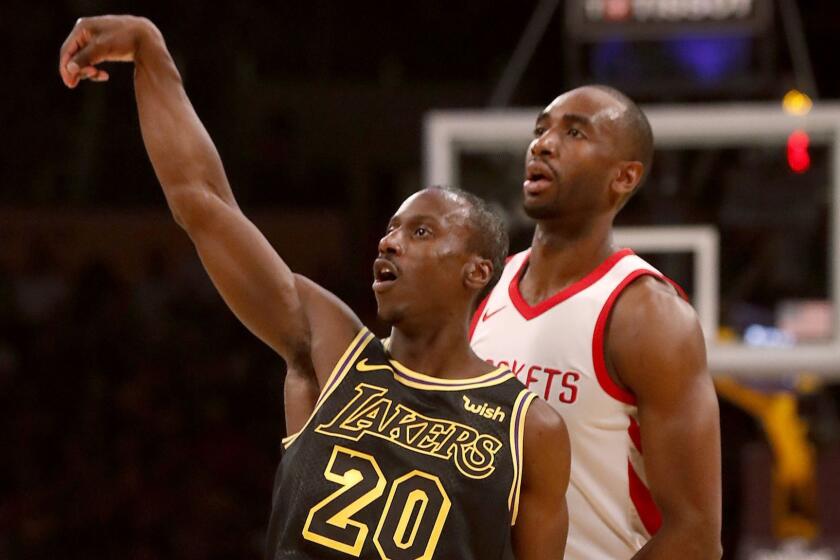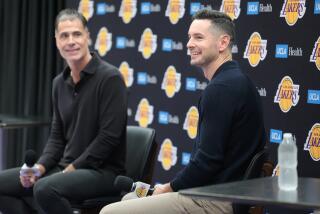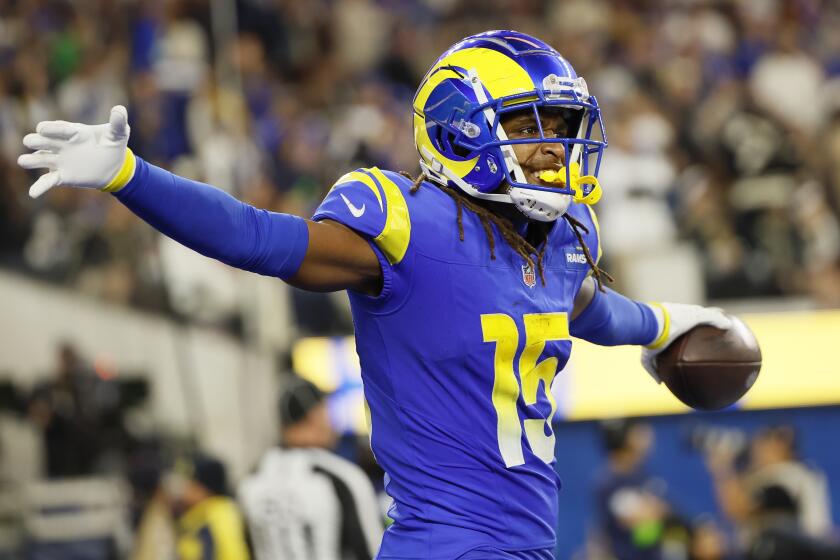G League sends more than players to NBA, and Lakers could have the best prospect
LAS VEGAS â The NBAâs top executives still come to the G Leagueâs showcase event on a hunt, searching through the slow-footed big men, the undersized guards and the shooters to find the rare player who could someday make a difference on their teams.
The best teams in the NBA have players who were unearthed in the NBAâs developmental league. The Lakers rely on three G League alums â Danny Green, Quinn Cook and Alex Caruso.
That already difficult search has gotten tougher. The G Leagueâs best players are either valued draft picks or intriguing projects on two-way deals with NBA teams, allowed to spend up to 45 days with the club. Itâs a result of the NBAâs growth â with all but two teams operating their own G League organization â and increased integration between basketballâs big leagues and its minors.
NBA teams have discovered that finding players who can help is only a fraction of what the G League can do. As franchises are learning, they can use the G League to develop everyone.
The Clippersâ in-arena host, Hannah Cormier, worked in the G League. The Lakersâ trainer, Nina Hsieh? G League too. From referees to general managers to head coaches, from public relations staffers to sales executives and marketing managers, teams are using the G League to enrich every department.
âThis has always been a place for development and growth, â G League president Shareef Abdur-Rahim said. âAnd as the league has grown and different parts of our business have grown ... and as our NBA teams and G League teams have integrated, the real learning and opportunities to develop are across the organization. ⌠You can get called up in a variety of different ways. That story doesnât get told often, but thatâs a big part of who we are as a league.â
One person in Las Vegas who eventually could get called up is South Bay Lakers coach Coby Karl.
âHeâs just a really good coach,â one NBA general manager said.
But knowing how to coach and how to be a head coach are two different things. Karl has become keenly aware of that during his three seasons running the bench for the Lakersâ G League team. Heâs had to learn how to delegate, how to manage practice schedules and how to disseminate information from scouting reports.
âThereâs no real right way to do it,â Karl said. âItâs just preference.â
Heâs been able to discover his preferences without the burden of pressures and personalities of the NBA. Take his belief in meditation, for instance.
Andre Ingram has labored in the NBAâs development league for many seasons, but his first chance to play for the Lakers touched many lives.
Karl, the son of former NBA coach George Karl, picked up on the practice from one of his mentors â Hall of Famer Phil Jackson. Someone with Karlâs pedigree â a professional player in the NBA and leagues all over the world, the son of a legendary coach â certainly would attract top-level attention. But working in the NBA wouldnât allow him to fully embrace all the things he wants to do.
âItâs obviously easier here,â he said. âThis is the first year Iâve led meditations with our group. I tried it last year with a recording. Itâs something I learned as a player from Phil. Itâs part of my life. Thatâs something I do in my daily life. To me, itâs been a very valuable tool in my life, that if I had practiced earlier, I wouldâve begun to understand myself much better. Thatâs my goal, to try and help these guys build self-awareness.
âI donât think I would have the courage to do it walking into a room with LeBron or AD or whatever first job Iâd get. Itâs something I always thought was valuable, but itâs obviously taken me four years to get to try it on this level.â
More than anything, the NBA has turned the G League into a laboratory for ideas. Sunday, theyâll play the finals of an in-season tournament with a $100,000 prize for the winning team â something that almost undoubtedly will be part of the NBA schedule in the next few years.
The atmosphere of the league has allowed Karl to experiment more, implementing something he saw in last yearâs NBA playoffs when Toronto coach Nick Nurse, a former developmental league championship coach, used some defensive strategies that traditionalists would dismiss as âgimmicky.â
Itâs something Karl discussed recently via text with Sacramento coach Luke Walton, who also got his coaching start in the G League.
âWe get to try things without the media pressure, without the billion-dollar organization on your back,â Karl said.
Organizations also use the G League as a place to promote people. The Clippersâ G League coach, Brian Adams, was on the teamâs bench as a video coordinator before being âsent upâ to coach the G League team in Ontario.
Itâs not easy. The travel is worse, the salaries are lower, the arenas are emptier and the attention is sparse. But the smartest teams know that the developmental league isnât just about finding the next Spencer Dinwiddie or Khris Middleton. Players can be longshots.
Developing people who will make an impact in your organization? Thatâs a much safer bet.
âAt times, I look at other positions and other opportunities and say, âWhy not me?ââ Karl said. âBut I think Iâve reached the point where I understand that this is an investment. And I truly love that I have it.â
More to Read
Go beyond the scoreboard
Get the latest on L.A.'s teams in the daily Sports Report newsletter.
You may occasionally receive promotional content from the Los Angeles Times.











